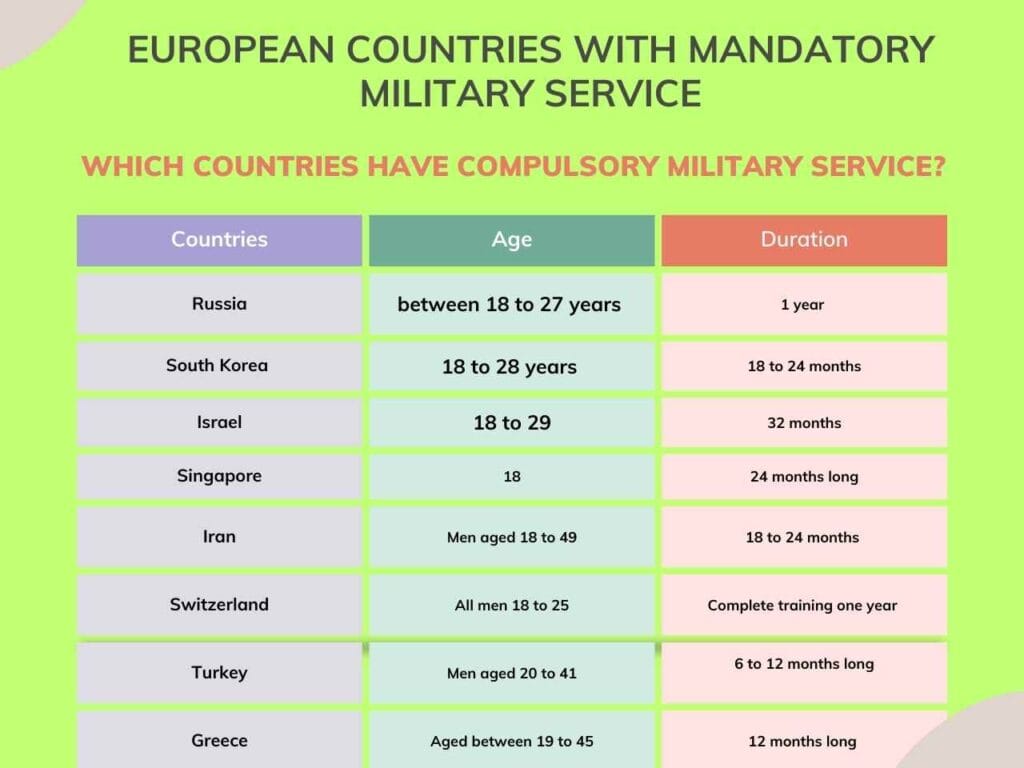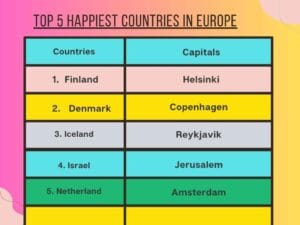Are European Countries with Mandatory Military Service?
Over the past 20 years, conscription abolished in most European nations. Several European nations were considering bringing back conscription but the War in Ukraine prompted nations to bring back conscription. Therefore, many nations reintroduce conscription. So, the lack of troops prompted decisions in some nations like Ukraine, Sweden, Denmark, and Norway to reintroduce conscription, and the Netherlands, Romania, France, and Germany mulled conscription.
Which countries have compulsory military service?
Nowadays many countries have compulsory military service, but we will discuss only the Top 8 countries that have the Top military mandatory services which are:
- Russia (All Men whose age between 18 to 27 years and the duration is 12 months long)
- South Korea (Men aged 18 to 28 years and duration are 18 to 24 months)
- Israel (Every Israeli citizen like Jewish, Druze, or Circassian which For Men: 32 months and for Women: 24 months)
- Singapore (For every male citizen and permanent resident and the duration is 24 months)
- Iran (Men aged between 18 to 49 years and the duration is 18 to 24 months long)
- Switzerland (All men aged 18 to 25 years and Complete training one year of conscription)
- Turkey (Men aged 20 to 41 and the duration is 6 to 12 months long)
- Greece (men aged between 19 to 45 and whose duration is 12 months long)

Should the EU become a Federation like the US?
Here the government operates on two levels: the federal government and state governments, Interestingly, both levels have their structure, each having a constitution, an executive, legislative, and judiciary branch. For example, there are two levels like:
1) on the federal level, there is the President, Congress, and the Supreme Court.
2) On the state level, there are governors, state legislatures, and state courts.
On The Federal Level
The federal government is based in Washington, D.C, and handles national issues like defense, foreign policy, currency regulation, and interstate commerce for the whole of the U.S. State governments, like California or Texas, handle state issues such as education, public safety, healthcare, and infrastructure within their borders. Just think: controversial subjects like the death penalty, abortion rights, and even the rules for electing the US President can vary in all 50 states! For example, 27 states still officially retain the death penalty, although, in 8 of these states, executions are currently suspended. The remaining 23 states have abolished the death penalty entirely. Now let’s look at a European country like France!
Unitary System Of European
Unlike the United States, France operates a unitary system rather than a federal one. In the unitary model, the constitution, along with executive, legislative, and judiciary powers, are concentrated at the central or National level in Paris. All major power is centralized at the top, where you’ll find the President, the National Assembly, and the Constitutional Council. This is where decisions on national issues like defense, foreign policy, education, healthcare, infrastructure, and almost everything else are made. While France is divided into regions and departments, they have limited autonomy, Regions, they have limited autonomy. Regions, like Normandy or Provence, manage local matters such as transportation and tourism, while departments handle responsibilities like social services and schools.
Options For Unitary Centralized State
Now, there are three options for the EU to become a unitary centralized state like France.
- But let’s be honest No one wants that, so we won’t even entertain the idea.
- Another option is to return power to member states, which comes with its own advantages such as more direct control over national policies and less interference from Brussels. But what does the EU currently have power over that could move back to the Member States?
As before, this graphic illustrates how power is divided between the EU and its Member States:
The first column lists the EU’s Exclusive Competencies, where only the EU can legislate while the second covers shared Competencies.
- The third option is moving towards a federation, In a federation, there is a clear definition of which policy areas are managed by the EU and which are left to the member states.
What are the Top 10 Happiest Countries in Europe?
To know completely about the Top 10 Happiest Countries in Europe read the article given below to get the complete information and enjoy this interested information about the European people.


